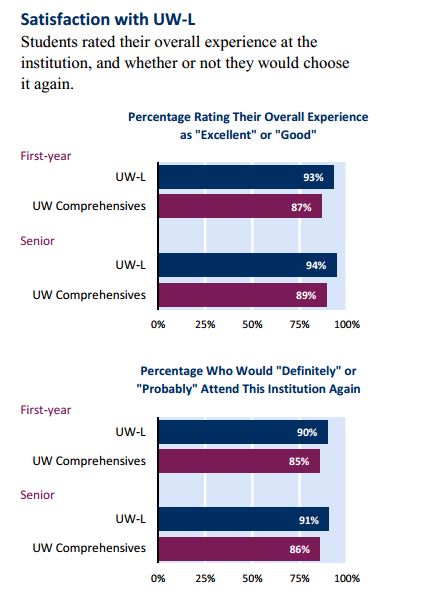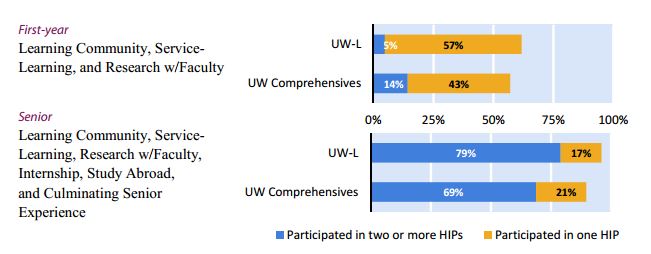Posted 3:20 p.m. Tuesday, Dec. 2, 2014

UW-L seniors gave high marks to their university when asked about their overall university experience on the National Survey of Student Engagement (NSSE)
 From the NSSE 2014 Snapshot.[/caption]
UW-L seniors gave high marks to their university when asked about their overall university experience on the National Survey of Student Engagement (NSSE). About 94 percent of seniors rated their college experience as good or excellent — that’s higher than the national average of 87 percent.
Both seniors and first-year students gave answers that reflected the high level of academic challenge they find at UW-L as well as the supportive campus environment.
The report, Bringing the Institution into Focus, released Nov. 20, includes results from more than 355,000 first-year and senior students from 622 U.S. colleges and universities that participated in NSSE in spring 2014. Questions provide insight about students’ undergraduate experience, which are used to improve student learning and overall success.
From the NSSE 2014 Snapshot.[/caption]
UW-L seniors gave high marks to their university when asked about their overall university experience on the National Survey of Student Engagement (NSSE). About 94 percent of seniors rated their college experience as good or excellent — that’s higher than the national average of 87 percent.
Both seniors and first-year students gave answers that reflected the high level of academic challenge they find at UW-L as well as the supportive campus environment.
The report, Bringing the Institution into Focus, released Nov. 20, includes results from more than 355,000 first-year and senior students from 622 U.S. colleges and universities that participated in NSSE in spring 2014. Questions provide insight about students’ undergraduate experience, which are used to improve student learning and overall success.
“The use of the NSSE supports our campus’ focus on understanding our strengths and working to improve the student learning experience,” says Patrick Barlow, UW-L’s assessment coordinator. “We are in the process of presenting these results to the campus including faculty and staff committees so we can acknowledge our successes and provide the data to those who can make refinements to our programs.”Some results reflected UW-L’s continued emphasis on the education of the whole person that is shown in the university’s seal, which bears the Latin phrase “Mens Corpusque,” which means “mind and body.” Compared to other UW System comprehensive campuses, 13 percent more UW-L first-year students and 11 percent more UW-L seniors thought that UW-L emphasized on providing support for their overall well-being — demonstrated through providing opportunities on campus to engage in recreational activities, receive health care and engage with supportive counseling. UW-L’s tradition of strong academics was also brought into focus. UW-L students reported significantly higher ratings than students at other UW System campuses on questions that measured the academic challenge they experienced. For instance, a series of questions measured “high-order learning” or how much coursework emphasized complex cognitive tasks requiring more than mere memorization. On all of these questions, UW-L first-year students average was significantly higher than other UW System comprehensive campuses. On a similar note, UW-L’s first year students on average reported more hours per week preparing for class and more time spent on assigned readings than students at other UW System comprehensive campuses. Compared to UW System comprehensive campuses, 13 percent more first-year students reported that they spent more than 15 hours per week preparing for class and 9 percent more first-year students reported they spent more than 10 hours per week on assigned reading.
Engaging undergraduates in practices that improve learning, retention
[caption id="attachment_37985" align="alignleft" width="651"] NSSE 2014 Snapshot[/caption]
At UW-L 96 percent of seniors have participated in at least one of the six undergraduate activities considered “high impact practices.” These particular activities have positive associations with student learning and retention. On the NSSE they include: learning community, service learning, research with faculty, internships, study abroad, or culminating senior experience. Among all UW comprehensive campuses, an average of 90 percent of students have participated in at least one high impact practice.
Many UW-L students participate in service learning, which is a high impact practice that also benefits the community. About 76 percent of UW-L seniors responded that at least “some” courses included a community-based project — that’s compared to 61 percent nationally and 64 percent at other UW comprehensive campuses.
One area where UW-L first-year students and seniors gave ratings lower than other UW System comprehensive campuses on average was regarding how often they had discussions of their academic performance with a faculty member. Compared to other UW System comprehensive campuses, 7 percent fewer first-year students and 2 percent fewer seniors had these discussions with faculty. UW-L is already addressing this issue with a new online notification system, Eagle Alert, in place that allows instructors and advisers to provide feedback on academic or professional concerns, student potential and advising sessions.
Additional information about UW-L’s NSSE results can be found on UW-L’s Quality Assurance website.
Learn more about NSSE.
NSSE 2014 Snapshot[/caption]
At UW-L 96 percent of seniors have participated in at least one of the six undergraduate activities considered “high impact practices.” These particular activities have positive associations with student learning and retention. On the NSSE they include: learning community, service learning, research with faculty, internships, study abroad, or culminating senior experience. Among all UW comprehensive campuses, an average of 90 percent of students have participated in at least one high impact practice.
Many UW-L students participate in service learning, which is a high impact practice that also benefits the community. About 76 percent of UW-L seniors responded that at least “some” courses included a community-based project — that’s compared to 61 percent nationally and 64 percent at other UW comprehensive campuses.
One area where UW-L first-year students and seniors gave ratings lower than other UW System comprehensive campuses on average was regarding how often they had discussions of their academic performance with a faculty member. Compared to other UW System comprehensive campuses, 7 percent fewer first-year students and 2 percent fewer seniors had these discussions with faculty. UW-L is already addressing this issue with a new online notification system, Eagle Alert, in place that allows instructors and advisers to provide feedback on academic or professional concerns, student potential and advising sessions.
Additional information about UW-L’s NSSE results can be found on UW-L’s Quality Assurance website.
Learn more about NSSE.